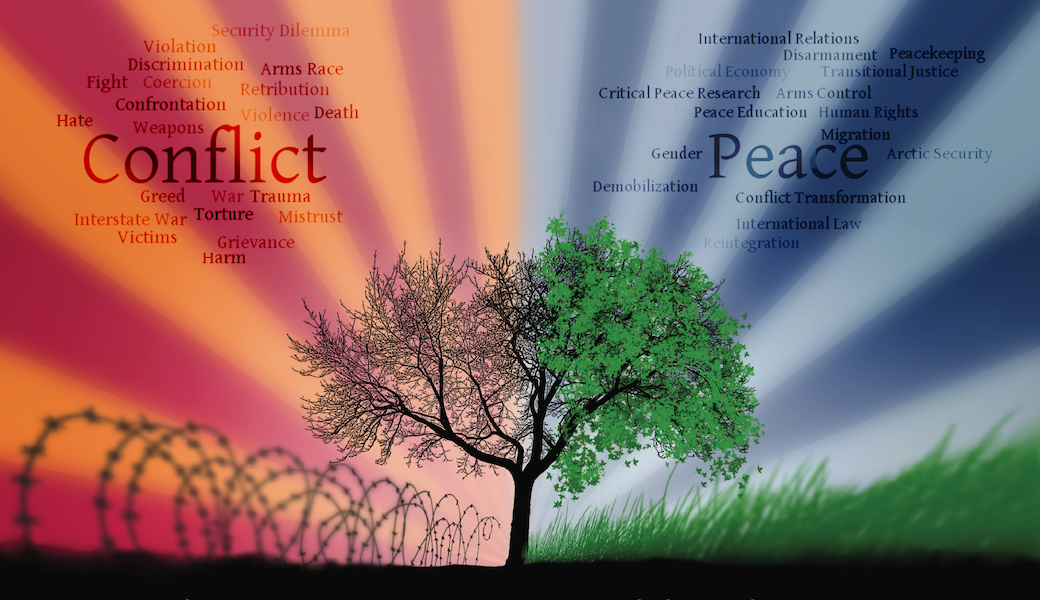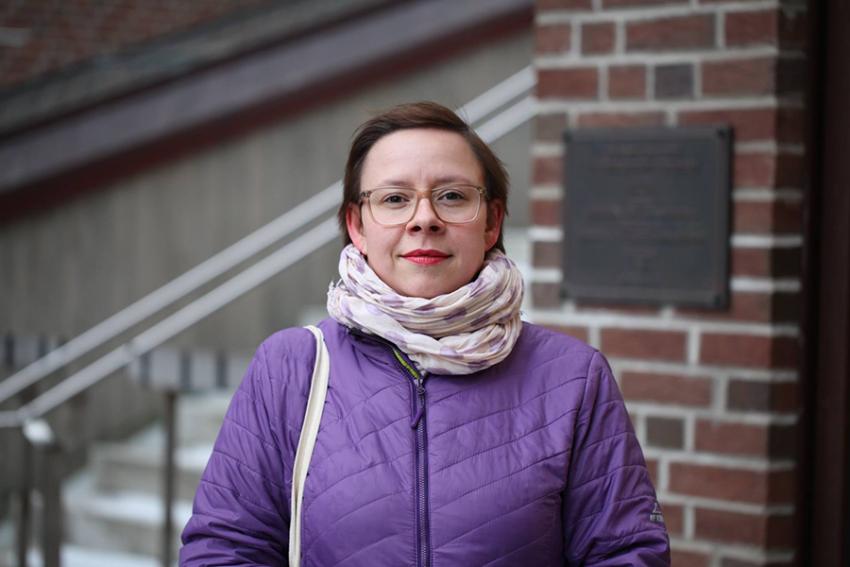The Master's programme provides an in-depth understanding of the key issues shaping the field of peace and conflict studies. It offers critical and interdisciplinary insights into the nature, causes, and effects of conflict, as well as strategies for building peace and restoring confidence in institutions within conflict-affected societies.
The programme actively recruits students from both Nordic and non-Nordic countries, fostering cross-cultural teaching and learning experiences.
Bachelor's degree (180 ECTS) or equivalent qualification in the social sciences, humanities, law, education, psychology or public health.
Grade requirement:
Applicants must have a minimum grade average comparable to a Norwegian C (2,5) in the ECTS scale.
English proficiency:
Applicants with education from non-Nordic countries must document English language proficiency. You will find more information about the English language requirements on our admissions pages.
Statement of Purpose:
Applicants must provide a Statement of Purpose (maximum of two pages). This Statement must state the applicant’s motivation for pursuing a Master's degree in this programme (i.e. relating prior academic achievements and professional experiences to the core concerns of the programme). There is no need for recommendation letters.
Admission capacity:
29 places.
Admission is competitive, based primarily on academic qualifications (educational background) and secondly on the quality of the Statement of Purpose.
You will find more information about international admission here.
Non-EU students must be prepared to pay tuition fees.
Her finner du all informasjon knyttet til søking og opptak.
- Nordic applicants: 5059
- EU/EEA + Swiss applicants: 7161
- Non-EU/EEA applicants: 2034
Program description
The Master's degree programme in Peace and Conflict Transformation offers critical and interdisciplinary insights into the nature, causes, and effects of conflicts, as well as practical skills for addressing conflicts through peaceful means.
The Norwegian High North provides a unique setting for studying the transformation of relationships between individuals, groups, and institutions—from destructive to constructive bonds. The programme is intentionally based in the city of Tromsø, which has a long history of fostering peaceful co-existence among local ethnic and cultural groups.
During the first year, students will attend compulsory courses that explore core debates and perspectives in the field of peace and conflict studies.
The second year primarily focuses on the Master's Thesis, which students develop with guidance from academic staff, based on their individual interests within the field of peace and conflict.
Learning outcomes
Graduates of the programme will gain advanced knowledge of the history, theories, and mechanisms of peace and conflict studies, including the causes of violent conflict and methods for conflict transformation. They will develop critical and creative thinking skills, enabling them to conduct independent research, analyze data, and assess scholarly work effectively.
Graduates will also acquire the ability to present and discuss their work in academic and public settings while providing constructive feedback. They will be equipped to address ethical issues, apply their knowledge to new challenges, and contribute to innovation in the field. Reflecting on their own positionality, they will be prepared to engage with complex peace and conflict dynamics.
Job prospectives
The MPCT prepares students for challenging careers in sectors as diverse as security and diplomatic services, emergency and humanitarian assistance, international aid and donor agencies, and non-governmental organizations. In addition, MPCT offers transferrable competencies and skills for those who wish to pursue training in professions such as journalism and teaching. Ultimately, MPCT candidates may apply for admission to relevant PhD programmes.
Degree Name
Master of Philosophy in Peace and Conflict TransformationAccess to further studies
On successful completion of the degree programme, students may be qualified for admission to a PhD programme in a number of academic areas at UiT the Arctic University of Norway or elsewhere.
Related professions
Study plan
Language of instruction
English
Teaching and assessment
The curriculum constitutes a full-time study over two years, requiring approximately 1,500–1,800 work hours per year.
Learning activities include lectures, seminars, student presentations, peer reviews, individual supervision, excursions, and guest lectures.
The teaching and learning methods are problem-based, utilizing real-world cases and issues as teaching materials. These methods include lectures, seminars, and self-directed readings, all designed to enhance students' problem-solving and analytical skills, independent thinking, and critical evaluation. The programme's faculty includes renowned experts in their fields, both from the Centre and international institutions. The diverse teaching methods aim to strengthen students' problem-solving capabilities.
Each student will be assigned a thesis supervisor during the first year of study, primarily from one of two research groups affiliated with the Centre: the Peace Research Group and The Grey Zone. Supervision is provided through seminars and individual tutorials.
Studying abroad as part of an exchange programme will make you more competitive in the job market. It enhances learning outcomes, improves language skills, and provides unique adventures and international experience.
The Master’s degree programme in Peace and Conflict Transformation has bilateral exchange agreements with universities abroad, allowing students to take modules that can be approved as part of their degree. The programme facilitates outbound student exchange in the third semester, with some reservations regarding the availability of modules at the partner university.
Exchange studies abroad will make you more attractive on the job market. Studies abroad will increase your learning outcomes, improve your language skills, give you unique adventures and international experience.
The Master’s degree programme in Peace and Conflict Transformation (MPCT) has bilateral exchange agreements with universities abroad where the student may take modules that will subsequently be approved as part of the degree. In this degree programme, we make room for outbound student exchange in the 3rd semester. We make certain reservations concerning what modules the exchange university has to offer.
Destinations for studies abroad
Mohammad Musfequs Salehin
Førsteamanuensis i freds- og konfliktstudierThis is what the students are saying
Vil du vite hvordan det er å være student ved UiT? Følg @uitstudent på Instagram eller TikTok, hvor studenter deler fra livet på universitetet. Her får du praktiske tips om studier og studentliv, nyttig informasjon om campus og muligheten til å stille spørsmål om alt du lurer på.
For mer informasjon om studietilbud, forskning og muligheter direkte fra UiT, kan du følge @uitnorgesarktiske på Instagram eller TikTok. Her finner du offisielle oppdateringer og innsikt i hva universitetet har å tilby.




